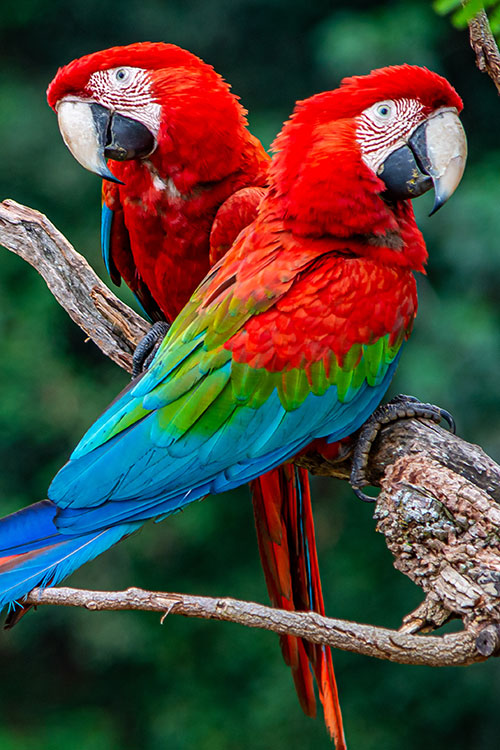
Put an end to all the screaming

Stop stressful aggressive behavior

Bring relief from feather plucking, picking, and self-mutilation
Learn how to train your bird like a pro
Though no longer legally wild-caught, parrots are technically tamed wild animals. Most species are only a few generations removed from their natural habitat and are still learning to adapt to ours.
Our in-home bird training program focuses on helping your bird live happily and successfully in your home. You’ll learn how to stop unwanted bird behavior, replace it with behavior you enjoy, and keep your bird’s brain occupied and out of trouble.
If you’re like most of our clients, you’ll also catch the bird training bug. (Say that 5 times fast!) Your new training skills can be put to all kinds of use, like training groovy bird tricks to impress your dinner guests.
But first, let’s get your bird problems solved and restore peace to your household.

“When I rescued an unruly Quaker parakeet I had my work cut out for me. I was fortunate to meet Joanna of Fur and Feather Works. With Joanna’s help Butters calmed down and would let people sit peacefully in the same room without eating them. I definitely recommend anyone who has a bird or who is interested in getting a bird talk to Joanna.” – Butters’ mom Ruby, condensed from her Yelp review
Do you guarantee your parrot training?
No. Be wary of trainers who guarantee parrot training results. Behavior is fluid and ever changing, and your bird is not a feathered computer that can be reprogrammed. The success of any parrot training program depends on many factors, many of which can’t be ethically placed under a guarantee. We are dedicated to a better approach to training.
What we can, and do, guarantee:
Is my parrot too old to train?
There’s no such thing! Parrots, like any intelligent animal, are capable of adapting and learning throughout life. Sometimes learning new habits or behaviors can improve an older parrot’s quality of life (and yours) immensely. The outcome of any parrot training program depends on many factors, none of which include age.
Is it true that he should never be allowed higher than my head because he will become dominant?
No. There is no corroborating evidence from behaviorists, biologists, or ornithologists that parrots have any such linear social structure in the wild. Birds like to perch high up because a) they instinctively feel safer from predators and b) it keeps them out of reach of unwanted human hands and “step up” commands. If you’re having trouble with getting your bird to step up, contact us!
My budgie (or parakeet) or cockatiel isn’t really a parrot, is he?
Yes he is! He is a member of the Psittaciform order, and he shares the same defining characteristics of his “family” members – a curved beak and zygodactyl feet (two toes pointing forward, two pointing back). And, just because he’s small doesn’t mean he isn’t smart – Joanna’s cockatiel rivals her Amazons in problem solving ability, and a budgie named Puck holds the world record for largest vocabulary of any bird (1,728 words)!
We love bird training. We love teaching. And we believe in being the best at both.
Privacy Notice
Copyright © 2024 · Fur and Feather Works, LLC